
by Jason Joyner | Mar 11, 2013 | absolutes, Biblical worldview, Blog, farkles, Mission Monday, The Island
 |
| Obi-wan and Black Widow on the run |
Yesterday my twelve year old and I were having an in-depth conversation. I had been watching The Island during my workouts, and he slipped in and watched with me.
If you haven’t seen it, The Island is an underrated film dealing with a lot of ethical issues. The definition of life, the value of life, and the potential future medical dilemmas make for interesting mental fodder. (There are plenty of explosions and helicopter chases Mark, so it’s up your alley as well :D).
My son and I discussed some of the implications of the movie. He made the comment, “Boy, if I could talk to everyone about their worldview, I could agree with all of them.”

This statement surprised me.
We’ve taken care to teach our kids about worldview and what it means to have a Biblical worldview. We use the book Who Is God? (And Can I Really Know Him?) to teach them about God and His character and ways. I thought we’d done a lot to inform them about this kind of thing.
I talked to him about worldviews and how everyone has one, but if anyone can make their own standards, how can we know what is true. Is there an objective standard?
I grabbed a ruler and measured my water jug. It was 8 inches high. I then told him about a guy who didn’t like inches, so he made up a new measurement: farkles. According to these measurements, the jug was 15 farkles high.
Which one is right? How do we know what farkles are?
My analogy has some holes. Inches are arbitrary as well. Still, I showed him how we can be confused if we all appeal to a different standard. If the Bible is truly what it says it is, the revealed Word of God, then we have a standard from the One who made everything and is worthy to establish an objective measurement.
Hopefully my message got through. It made me realize that we have to be diligent in always training our kids up in truth and pointing them to Jesus. I ended with saying that I believe the Bible to be our standard and living for Jesus to be our ideal-but that I couldn’t make my son believe the same things. He would need an encounter with God on his own, that he was responsible for his own walk with God. I can lead them to water, but I can’t make them drink, as the old saying goes.
Anyway, I’ll keep training them as best I can, and pray that they will be able to grab hold of Jesus and all He has for them in their lives. That’s the frustrating thing about being a parent. No matter how much you value something, you can’t force things on your kids. They need to come to their own understanding of it. I believe it will happen for my children.
I just wish it would hurry up. 😉
—

by Jason Joyner | Dec 12, 2012 | Biblical worldview, Blog, CBA, christian fiction, Christian marketplace, Marcher Lord Press, speculative fiction, Writing Wednesday
Now this is interesting…
There was a very interesting confluence of circumstances in the world of Christian or CBA fiction this week. First of all, I am a member of the American Christian Fiction Writers (ACFW) and I subscribe to the main email loop for discussion of issues in Christian fiction. I haven’t been following it for a while, but this week I happened to open up my digest and there was an interesting (if not new) discussion.
How “Christian” should our stories be?
Larry Timm started the discussion with this question on his blog and he threw it out to the ACFW loop as well. Both the comments on Larry’s post and the answers on the email loop were enlightening.
The answers varied, for sure. Some thought that Christian novels should explicitly glorify Jesus in some way. Being a sweet romance without profanity or sex wasn’t enough. Some answers thought there should be some lesson or purpose in the story. Others wondered if their stories could be considered Christian if there wasn’t a path to redemption/salvation shown clearly in the text. There was concern that the message may be watered down in the current climate to appeal to wider audiences.
Is it enough if the worldview Christian, if the characters are Christians and live, make mistakes, and learn from their sin, without preaching it to the reader? Is there a place for good, clean fun, or do they all have to change our lives somehow? I liked what Randy Ingermanson said, something to the effect that we’re called to be salt, but people like different levels of saltiness in their soup.
The consensus seemed to move toward different stories for different folks. Authors may be called to tell stories with the themes veiled or more subtle, while others may want to specifically deal with a theological/moral topic. People were respectful. It is an old debate in the CBA world, and it will continue to recycle as long as we continue to write.

What made the timing interesting to me was the introduction this week of…
The Hinterlands.
Marcher Lord Press has developed a significant niche in the CBA world as the go-to place for Christian speculative fiction. Other publishers will produce some science fiction or fantasy, but no one sells out for it like MLP.
Now they are ready to push the boundaries – figuratively and literally, it seems.
Hinterlands is the new MLP imprint for mature fantasy and sci-fi. It is designed to reach out to people who love secular fantasy/sci-fi but wouldn’t pick up a typical Christian novel. The first book is called A Throne Of Bones by Vox Day, and it is specifically targeted to be for fans of epic fantasy such as George R. R. Martin and his Game Of Thrones series.
According to an article in Christian Retailing, Hinterlands will feature books with content that does not always mesh with traditional CBA fare.
“Just as some Christians have the ability to watch R-rated movies without stumbling and others do not, so it will be with A Throne of Bones and other titles to come in the Hinterlands line,” [Jeff Gerke] said.
MLP’s owner and publisher Jeff Gerke went on to say,
“It’s not going to be erotica, and the characters aren’t going to be dropping f-bombs left and right,” he said. “But these books will still have more mature content than other Christian novels. Having these books in their own imprint will allow our fans to find the Marcher Lord Press books they’re interested in and avoid the ones they would rather avoid.”
“Hinterlands books may contain vulgarity, profanity, nudity and/or sexual content, but never for gratuitous purposes. Hinterlands allows us to pursue crossover publishing that will put the word of the gospel before people who would never otherwise pick up a Christian novel. It also allows us to examine mature themes in a realistic manner that some Christians will appreciate. We know that not everyone will want to read these books, so we have set them apart into the Hinterlands imprint.”
So we have two separate streams in the CBA realm that may be flowing in parallel, or depending on your viewpoint, moving far away from each other.
One side sees Christian fiction as standing apart from the world. Generally this group sees Christian fiction through the lens of Philippians 4:8, wants to see a clear story of redemption or salvation, and hews to an evangelical Christian framework.
Hinterlands is new ground that is trying to engage the world in realistic ways. This imprint could be the publishing home for stories from the Bible like Judges, Genesis 34 or 38, or be a realistic portrayal of life of King David. It sounds like they will take great care to avoid gratiutous use of profanity, violence, or sexual situations, but they won’t avoid it wholesale if the story seems to require it.
I am very interested in seeing how this plays out. Can MLP succeed in this bold initiative with Hinterlands? Is there room for Christians producing this type of literature? At least, is there room in the CBA world? With the new world of the internet and social media, perhaps the old forms of marketing and distribution aren’t needed anymore, and a niche like Hinterlands can succeed and reach people.
Can we reach people with gritty stories? This question has been debated in the CBA for a while now. I guess we’ll be finding out with Hinterlands.
—
What do you think? I’ve got my opinions for a later post, but I want to hear from authors and readers of Christian fiction and speculative fiction. What is Christian fiction, and is there room for Hinterlands-type books in it?
—
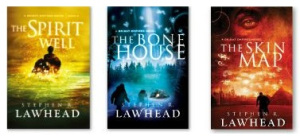
by Jason Joyner | Oct 24, 2012 | Biblical worldview, Blog, Bright Empires, CSFF, speculative fiction, Stephen Lawhead, The Spirit Well, themes
In Which The End Game Becomes Visible, If Only For A Moment.
This mind-bending series is a fascinating mash-up of quantum physics, historical mystery, and pre-Starbucks coffee culture with an Indiana Jones twist. Lawhead is a gifted writer and this ambitious five book set challenges his readers with a forth and back approach as the characters wind through multiple dimensions stretching from Macau to ancient Egypt to modern day London and even the Stone Age.
This is all well and good, but if this is the Christian Sci-Fi and Fantasy tour, where is the Christian part?
There have been praying monks and characters who mention God, but there is also a mysterious well with resurrection-like power and the pesky dimension-hopping that seems to contradict things we know. Why is this series published by a Christian publishing house?
The Spirit Well gives us our first substantial insight into the spiritual underpinnings of the series on pages 304-305. Cassandra Clarke is a young paleontologist who was swept up by this dimensional traveling to 1930’s Damascus and has met up with two strange people from the Zetetic Society. She is being asked to join this group in their quest to encourage the “transformation of the universe.” The society members are afraid that reaching a special landmark called the Omega Point will be thwarted by the enemies of good unless the Society can succeed.
The skeptical scientist points out a fallacy at this:
“So,” concluded Cass, “Almighty God is not strong enough alone to bring about His purpose for the universe. He needs you and your society to make it happen; otherwise it has all been for nothing. Is that what you’re saying?”
That isn’t the end of it. Cassandra voices a reasonable doubt at what she’s being told. Still, her experience of traveling through time and space has changed her paradigm already. The beauty of what has happened so far in the Bright Empires series is brought out by the elderly Mrs. Peelstick in response:
“…God has always worked through the small, the insignificant, the powerless – it seems to be sewn into the very fabric of the universe…
…Over and over again, we see that when anyone willingly gives whatever resources they have to Him – whether it is nothing more than five smooth stones gathered from a dry streambed or five little loaves of bread and two dried sprats – then God’s greater purpose can proceed…
…And one poor, wandering country preacher – homeless, penniless, friendless, and despised by all but a handful of no-account fishermen and a few women – gave himself so fully to God that the combined might of the two most powerful forces in his world – the Roman empire and the religious authorities – could not stop him.”
One simple speech, expertly seated in the mid-point of the series, anchors this tale in the ways of the Almighty God. Stephen Lawhead has been writing at a high level for many years. He didn’t reveal the spiritual underpinnings right away. The wait made it more poignant when it finally came. Patience is a powerful weapon for the author.
We may want to rush to make it known that our work points to Jesus. I think it is better when it is placed in the proper context. After 2.75 of the series, we finally see the glow of the Light of the world. It is not dwelled upon. The characters move on. But the wait is worth it. The impact left me with a highly satisfied feeling, seeing an image in the tapestry pop out after it was just out of view the whole time.
Sure, the dimensional aspect is not in our usual understanding – but this is speculative fiction after all.
There’s something to perseverance, both in writing and in reading. Lawhead stated he’s waited 15 years to write this book, and just now feels he can do it justice. I’m thankful that an enjoyable yarn has such a careful craftsman at the helm.
Does this book sound interesting to you? Leave your thoughts below. Be sure to check out the other blogs posting. Becky Miller keeps a list of the posts for you.
We’ll see you next month. Unless one of us stumbles upon an active ley line first…
—
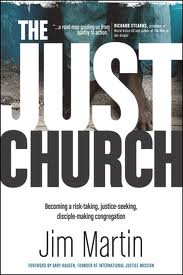
by Jason Joyner | Oct 8, 2012 | Biblical worldview, Blog, books, IJM, International Justice Mission, Mission Monday, reviews, social justice
He has shown you, O mortal, what is good.
And what does the Lord require of you?
To act justly and to love mercy
and to walk humbly with your God.
The words of the prophet Micah are spoken in churches all over the world. Believers love this simple declarations of what Jesus asks of His people.
Christians try hard to walk humbly with the Lord. We strive to show mercy to people. However, we often ignore or struggle with the clause of “acting justly.” Especially for Western Christians, the command for justice is flat-out missed or simply misunderstood.

There is a new move of the Spirit, awakening His people to the need to provide justice for those who cannot speak up for themselves, to proclaim freedom to the captives, to minister to the widow and orphan. It is a slow burn, but it is exciting to see the embers leaping into flame in various places of the body.
A new spark is being provided by the new book
The Just Church by Jim Martin of the organization
International Justice Mission (IJM).
IJM has been fighting for justice for many years now and is one of the leading organizations battling injustices like forced labor, human trafficking, sexual exploitation of women and children, and modern-day slavery in all its forms.
Jim Martin has been working with them after transitioning out of the pastoral role in his church, becoming a church liason with IJM. This experience made him especially qualified to write The Just Church.
This book is a challenge to the body of Christ to reclaim the lost aspect of Micah 6:8 and to actively act justly in the world. There are other books that try to awaken Christians to the need of justice and to expose the problems of modern slavery and other forms of bondage towards vulnerable peoples that is easy to overlook in our daily lives. The Just Church is a book that takes the church on journey to forming a viable justice ministry to compliment evangelism and mercy ministry.
The book is laid out in three sections. The first section establishes a theory that faith doesn’t really grow without significant risk and suggests that justice ministry is a needed part of the church and can help develop a healthier discipleship in His people. The second section takes the reader through a practical journey on establishing a justice ministry in the local church. It isn’t a step by step approach, allowing for the individual characteristics of any body guide the process. The last part of the book is a series of appendices with Scriptures on justice, resources for following through, and study materials. Each chapter ends with a QR code that can be scanned by a smart phone or tablet, leading to a video with Jim summarizing each chapter’s main point.
It is well-written with an easy conversational style. Jim lays out the challenges inherit in this type of ministry and doesn’t sugar-coat it. It won’t be easy. But he recognizes the hope that is out there for people if Christians will rise up and stand in this gap, so the book is infused with this balance of challenge and hope.
Any critiques are minor. The videos are a very nice multimedia touch in this day and age – but I’m a fast reader so I’d rather not slow down and watch a movie. Those who like this feature will be pleased. Also, sometimes the book seems too much like a selling tool for IJM. I realize Jim works with them and is most familiar with their work, but there are other fine organizations out there doing similar work as well. This isn’t a big issue, and I support IJM financially myself.
Overall I am thrilled to have had a chance to read this book and see the new horizons coming in the fight against injustice. The need is starting to become known in the western Church. The Just Church takes the movement to the next step and provides a practical tool to those churches looking into how they can join in the justice ministry sphere. It isn’t for special groups like IJM or others listed on my links on my blog. The Bible speaks very clearly about God’s love of justice and it is every Christian’s responsibility to see the threefold thrust of Micah 6:8 walked out in the world today.
I’m thankful to Jim Martin and IJM for their work. I did receive a preview copy for promotional purposes, without any expectation of a positive review. My endorsement is heartfelt. The Just Church is a powerful tool in the battle against modern injustice. I highly recommend it.
—
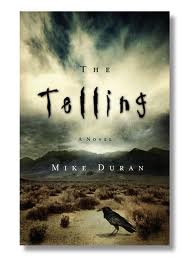
by Jason Joyner | Sep 27, 2012 | Biblical worldview, big ideas, Blog, CSFF, Mike Duran, speculative fiction, The Telling
I left off last time on our CSFF tour feature of The Telling by Mike Duran with a teaser. I reviewed the book, but didn’t address the main idea of the book.
That requires a post of its own.
Mike’s main character has a gift he calls “the Telling.” It is basically prophecy – he gets words for people or others. It often comes with a physical sensation that makes him sick.

Prophecy isn’t controversial, is it?
The problem in the book is the ninth gate of hell that happens to be nearby and is threatening to take over the small California town of Endurance.
A gate of hell isn’t controversial, is it?
The demons that infiltrate Endurance make copies of people’s bodies, creepy doppelgangers that know the person’s every thought and desire.
That isn’t controversial, is it?
None of this would be controversial if it weren’t in the Christian fiction arena. The thing that could make it very risky is that there is a clear representation of faith and needing God’s touch in the midst of more unorthodox aspects of the story.
I don’t want to spoil the story, but needless to say Zeph Walker has some issues since he has a huge scar marring his mouth inflicted by a psychotic stepmother. After being hurt, he stopped using the Telling – or it left him. Either way, there’s a theme of finding your way back to faith. The tagline for the book is awesome: A prophet never loses his calling, only his way.
So the theme of coming back is a decidedly Christian one. However, since The Telling mixes God with mythical gates of hell, demons that don’t possess but make really good paper mache copies of people, strange demon fighters, and a blend of science and the occult – is it truly Christian fiction?
I say yes.
I don’t believe a novel has to be orthodox to be Christian fiction. Maybe it comes from too much familiarity with Mike Duran – I know that he loves Jesus and loves the Church and the Word. But we have a huge precedent with C.S. Lewis and the Chronicles of Narnia. Witches and talking horses and all sorts of magic run through the story, yet all but the most conservative of Christians accept it as one of the prime examples of exemplary Christian fiction. Even though J.R.R. Tolkien didn’t claim to be writing Christian fiction with The Lord Of The Rings, it is still considered a more veiled version of Narnia.
I know others will disagree. We had a fine gentleman with good thoughts leave the CSFF because too many stories we featured weren’t orthodox enough for him. So whose orthodoxy will we use? In mine, prophecy is good to go, but other Christians won’t agree to that at all. This will continue to be an issue no matter what we do.
I wish I had been able to visit the other blogs on the tour and see the chatter. Unfortunately between computer glitches and backed-up sewer lines in basements (honey, let’s do a spontaneous renovation of the downstairs) I haven’t seen much of anything. I aim to fix that and check out the opinions, because I’m sure this is going to be an interesting conversation. As always, our stalwart leader Becky Miller keeps up with the latest and greatest posts of the tour.
—
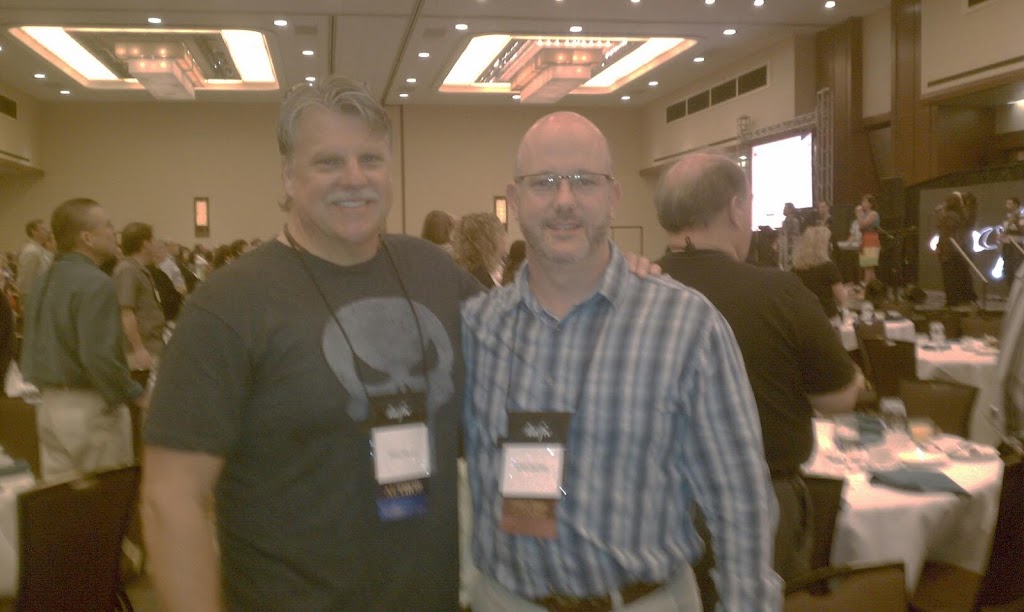
by Jason Joyner | Sep 24, 2012 | Biblical worldview, Blog, books, critical thinking, CSFF, Mike Duran, speculative fiction, The Telling
It’s time to “Tell” you about the September Christian Sci-fi and Fantasy Tour.
This one is a pleasure for me because the CSFF is featuring Mike Duran and his latest novel, The Telling.
Mike Duran is an author and prolific blogger. His blog Decompose is a fertile ground of ideas that make you think. Not only does Mike post provocative thoughts on faith, fiction, and culture, but the community of commenters he has following him often expand the posts into very interesting realms.
Mike is not afraid to ask the hard questions or probe issues regarding Christian fiction and speculative ideas. However, he has a deep love for the Church and regularly pokes at the foibles of atheist and relativistic thinking.
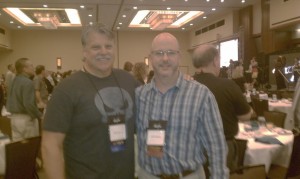 |
| Mike and I chatting it up |
The best part about Mike is that he is real and he is interested in people and exploring these issues. I know this because I had the great pleasure of meeting him this last weekend at the ACFW Conference in Dallas.
If this post sounds gushing because I just met the guy and I’m talking him up, you can forget that idea. The web does not allow for really knowing people, no matter how much you think it does. The face-to-face with Mike and bouncing ideas off him and other like thinkers (here’s a shout to fellow CSFF tour member Morgan Busse) over meals was a highlight of the conference to me.
Over the next few days we’ll be talking about Mike and The Telling. I’m sure it will be a tour with a lot of discussion. I invite you to check out my fellow tourmates below for more information.
Jim Armstrong
Noah Arsenault
Keanan Brand
Beckie Burnham
Brenda Castro
Jeff Chapman
Christine
Theresa Dunlap
Victor Gentile
Nikole Hahn
Bruce Hennigan
Julie
Carol Keen
Emileigh Latham
Meagan @ Blooming with Books
Rebecca LuElla Miller
Anna Mittower
Kathleen Smith
Donna Swanson
Jessica Thomas
Steve Trower
Dona Watson
Shane Werlinger
Phyllis Wheeler
—








